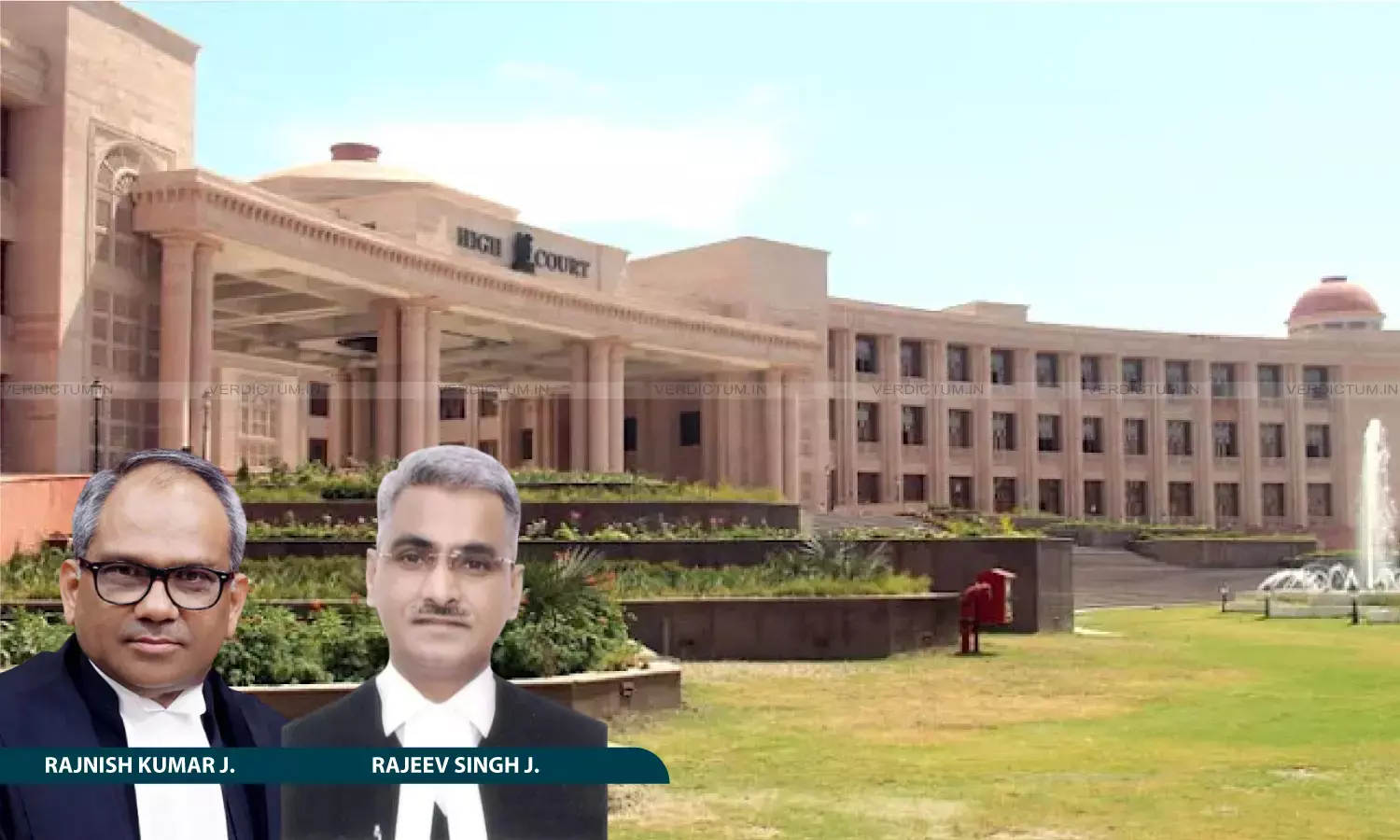No Evidence Of Pre-Meditated Mind: Allahabad High Court Commutes Death Sentence Of Man In 5-Month-Old Cousin’s Rape Case
The Allahabad High Court said that though the death penalty can be awarded in the ‘rarest of rare’, but normally imprisonment for life without any remission may be awarded, unless death sentence is inevitable.

Justice Rajnish Kumar, Justice Rajeev Singh, Allahabad High Court, Lucknow Bench
The Allahabad High Court has commuted the death sentence of a man to life imprisonment, who was convicted for the alleged rape of his 5-month-old cousin in the year 2020.
A Capital Case arose out of the reference made by the Trial Court before the Lucknow Bench for confirmation of the death sentence of the convict and an Appeal was preferred by the convict against his conviction.
A Division Bench comprising Justice Rajnish Kumar and Justice Rajeev Singh held, “Adverting to the facts of the present case, which is based on circumstantial evidence in regard to the offences under Sections 376 and 302 I.P.C. and the convict/appellant was aged about 27 years at the time of incident having a child of 3-4 years and though the learned trial Court has considered the circumstances in detail but without any report of Probation Officer, Jail Administration and Psychologist of evaluation and there is no criminal history of the convict/appellant and there is no evidence that offence was committed with pre-meditated mind, this Court is of the view that the death penalty is liable to be commuted to life imprisonment till the natural life of convict/appellant without remission.”
The Bench said that in a case based on circumstantial evidence, in which, offence is under Section 376 of the Indian Penal Code, 1860 (IPC) with Section 302 of IPC, though the death penalty can be awarded in the ‘rarest of rare’, but normally imprisonment for life without any remission may be awarded, unless death sentence is inevitable.
Advocate Rajesh Kumar Dwivedi appeared on behalf of the Appellant, while Government Advocate V.K. Singh and AGA Raj Deep Singh appeared on behalf of the Respondents.
Facts of the Case
As per the prosecution case, in February 2020, the marriage of daughter of a man of the Complainant’s village was held, in which Complainant’s wife and his sister-in-law along with children had come. In the evening, the real nephew of the Complainant took his daughter aged about 5 months from his wife on the pretext of playing and went away. For a long time, the Appellant-convict did not return along with his daughter, therefore, his wife searched for her but she could not find her.
After extensive search for a long time, it came to light that his daughter has been found lying in an unconscious condition amidst the bushes of a vacant plot at some distance from the marriage lawn, who was admitted in a trauma centre, where his daughter had died. It was alleged that the Appellant had killed the Complainant’s daughter after kidnapping and doing misdeed with her. Hence, a written complaint was registered. The Trial Court convicted the Appellant under Sections 376 (Ka) (Kha), 364, and 302 of the IPC and Section 6 of the Protection of Children from Sexual Offences Act, 2012 (POCSO Act). He was awarded death sentence and hence, the case was before the High Court.
Reasoning
The High Court after hearing the contentions of the counsel, observed, “In view of above and considering the over all facts and circumstances of this case, this Court is of the view that the prosecution has been able to prove the prosecution case on the basis of circumstantial evidence and all the chain of circumstances, as discussed above, refers only towards the guilt of the convict/appellant only without reasonable doubt and that heinous crime of rape with a minor girl of about five months was committed by the convict/appellant only and thereafter she was put in such condition, on account of which she succumbed to the injuries sustained by her and died.”
The Court was of the view that the Trial Court has rightly and in accordance with law recorded the findings on the basis of evidence and material on record holding the convict/Appellant guilty and convicted him.
“This Court does not find any illegality, error or perversity in the findings recorded by the trial Court on the basis of evidence and material on record, which may call for any interference by this Court”, it added.
The Court remarked that dealing with the ‘aggravating’ and ‘mitigating’ circumstances, the Court may choose to give primacy to life imprisonment over death penalty after making an inquiry for enabling the consideration of the facts mentioned in the cases.
“The conviction of the convict/appellant for the offences punishable under Section 302 I.P.C., 364 and 376 (Ka)(Kha) I.P.C. and Section 6 of POCSO Act, 2012 is upheld and the sentence awarded to him under Section 364 I.P.C. is confirmed. However, the death sentence awarded to the convict/appellant for the offences under Section 302 I.P.C. and under Section 376(ka)(kha) I.P.C. read with Section 6 POCSO Act, 2012 are commuted to that of life imprisonment for his natural life without remission”, it concluded.
Accordingly, the High Court partly allowed the Criminal Appeal and commuted the death sentence to that of life imprisonment for natural life without remission.
Cause Title- Prem Chand @ Pappu Dixit v. State of U.P. and Another (Neutral Citation: 2025:AHC-LKO:74250-DB)


